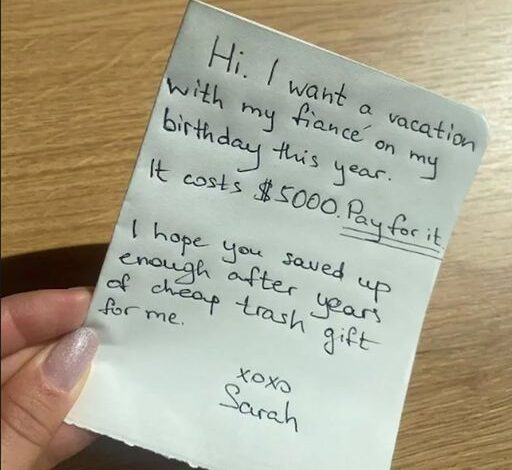Article: The Impact of Gift-Giving Expectations on Relationships

Article: The Impact of Gift-Giving Expectations on Relationships
The image shows a note that appears to be a demanding and somewhat unkind request for an expensive gift, specifically a $5000 vacation. The tone of the note suggests dissatisfaction with past gifts, which are referred to as “cheap trash gifts.”
Article: The Impact of Gift-Giving Expectations on Relationships
Gift-giving is a common tradition in relationships, whether during holidays, birthdays, or special occasions. The practice of exchanging gifts serves as a way to express love, appreciation, and thoughtfulness. However, when expectations surrounding gifts become unreasonable or are communicated in a negative manner, it can create tension and strain in relationships.
The Role of Expectations in Gift-Giving
Expectations play a significant role in how gifts are received and perceived. When one partner expects an expensive or specific type of gift and those expectations are not met, it can lead to disappointment, resentment, and even conflict. This dynamic can be particularly challenging if the giver feels pressured to spend beyond their means or feels unappreciated for the effort they put into choosing a gift.
The Importance of Communication
Effective communication is crucial in managing gift-giving expectations. Partners should discuss their preferences, financial limits, and what gifts mean to them. This conversation can help prevent misunderstandings and ensure that both parties feel valued and respected. Open dialogue about gift-giving can also help partners find ways to make each other feel special without relying solely on expensive or materialistic gestures.
The Emotional Impact of Demanding Gifts
When gift demands are expressed in a negative or critical way, as seen in the note from the image, it can cause emotional harm. The giver may feel hurt, undervalued, or pressured, which can erode the trust and goodwill in the relationship. Such behavior can signal underlying issues, such as feelings of entitlement, lack of appreciation, or unresolved conflicts.
Building Healthy Gift-Giving Practices
To foster a healthy approach to gift-giving in relationships, consider the following tips:
1. **Focus on Thoughtfulness:** A meaningful gift is one that reflects the giver’s understanding of the recipient’s interests, needs, and desires, rather than its monetary value.
2. **Set Realistic Expectations:** Discuss financial constraints and agree on a budget for gifts, ensuring that both partners feel comfortable with the arrangement.
3. **Express Gratitude:** Regardless of the gift, showing appreciation for the effort and thought behind it strengthens the bond between partners.
4. **Avoid Comparisons:** Resist the urge to compare gifts with those given in other relationships or from past experiences. Every relationship is unique, and gifts should reflect that individuality.
Conclusion
Gift-giving should be an enjoyable and loving aspect of relationships, not a source of stress or conflict. By communicating openly, managing expectations, and prioritizing thoughtfulness over material value, couples can ensure that their gift exchanges are a positive and affirming part of their relationship.




